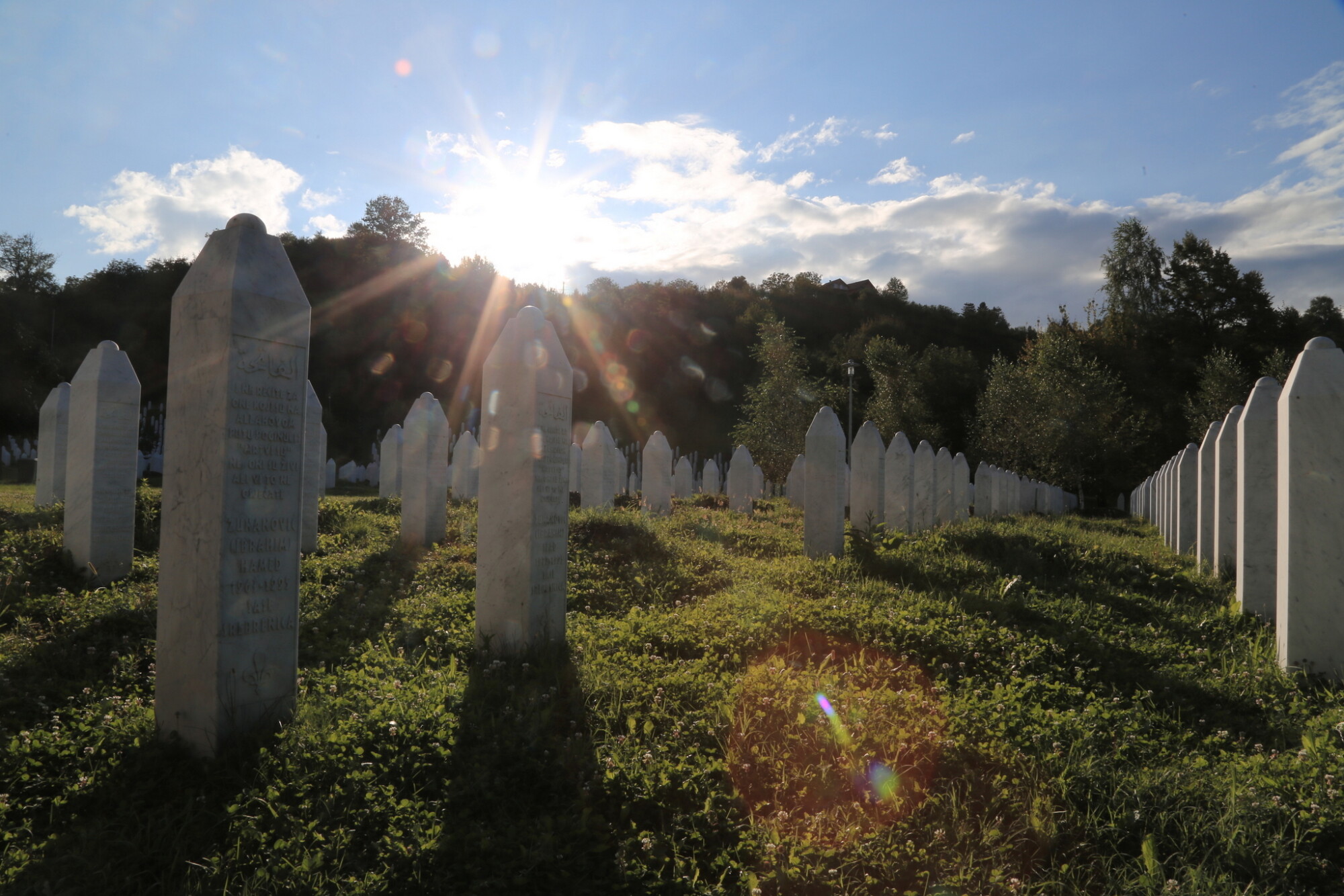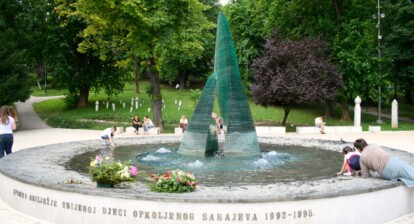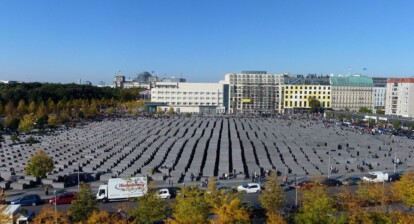Haris, an Austrian with Bosnian family-roots, shares his view on why remembering the past mistakes is crucial for ensuring a better future – as for Srebrenica. However, observant the current conflicts and humanitarian crises and in spite of the grave war atrocities, humankind clearly still hasn’t learned its lesson.
“Is anybody at the White House the least bit ashamed of what’s happened to the Bosnians in Srebrenica who trusted U.N. and U.S. policy?”
During my high school years my class in Austria was invited to the cinema to watch a movie on Srebrenica made by an Austrian-Swiss journalist. After watching the movie, one classmate approached me. She asked why she or anybody else should be interested in that topic, adding if we do not already have enough other pressing issues to be dealt with.
I was not able to answer the question at the time. I had watched a lot of war documentaries on Bosnia-Herzegovina, and particularly on Srebrenica. I knew that the war in Bosnia has influenced my life tremendously even if I did not experience it directly, since I grew up in the safe haven of Austria. Not to be even slightly interested in this topic seemed almost impossible to me.
Today, three years in delay, I am answering my classmate with the following arguments:
The International Community’s Failure to act
In 1994 the entire Eastern Bosnia was in Serbian hands – with the exception of the three Muslim enclaves, which were declared UN safe areas for civilians searching for safety. Back then it was already clear that those safe areas could not hold out long without any military support from the International Community.
Samantha Power, the current US ambassador to the UN, wrote in her book “A Problem from Hell – America and the Age of Genocide” that already in 1994 the US diplomat Richard Holbrooke warned the Dutch queen, that the Dutch UN troops in Srebrenica were facing a “catastrophe waiting to happen.”
Yet, the International Community did not act. R. Nicholas Burns, the Department of State’s spokesman, said that the decision has been made “not to put troops on the ground because we don’t believe it is in the vital interests of the United States to do so.”
A Tragedy
However, when Bosnian-Serb troops seized the safe area of Srebrenica on 11 July 1995 and shortly afterwards started to separate men from women, children, and the elderly, the Department of State did have the courtesy to send a public message to the army of Bosnian Serbs, saying that “they have a humanitarian responsibility to treat those people well.”
When the mass executions began, the main concern of UN officials, such as the UN-diplomat Akashi, was the UN’s reputation. In one of the meetings he suggested that “it would help if we had some TV pictures showing the Dutch feeding refugees.”
The International Community completely failed in protecting the innocent victims of Srebrenica, as they did earlier in Rwanda. Finally, it was the public pressure that urged President Clinton to act adequately. With the following NATO-bombings from August to September 1995 the Bosnian war almost came to an end as they motivated the war parties to negotiate peace.
Lessons to Be Learned
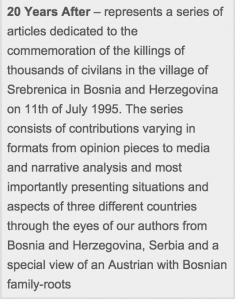 What we can learn from Srebrenica is the simple truth that we could have prevented the genocide. We have the necessary power to end such crimes if we take it seriously, or as the former High Representative of the International Community in Bosnia-Herzegovina, Paddy Ashdown, stated during a memorial service for Srebrenica in Westminster Abbey: “We could have prevented this horror. We chose not to”
What we can learn from Srebrenica is the simple truth that we could have prevented the genocide. We have the necessary power to end such crimes if we take it seriously, or as the former High Representative of the International Community in Bosnia-Herzegovina, Paddy Ashdown, stated during a memorial service for Srebrenica in Westminster Abbey: “We could have prevented this horror. We chose not to”
Public pressure and media coverage can force politicians to act. Samantha Power writes that the images of Muslims in concentration camps “inflamed public outrage about the war like no postwar genocide.” As a consequence 53 percent of Americans approved US air strikes, while before these photos were published only 35 percent approved such actions. However, the truth is that today hardly anyone cares. Of course, we all are shocked by such crimes and condemn them utterly – but that is about it. However, words don’t matter anymore. We have to take action.
In a public debate dealing with the Srebrenica case an American journalist Scott Simon once stated the following: “[…] No war crime short of Hitler seems to impress us. How close do such atrocities have to resemble the Holocaust for reasonable people to feel there is only so much genocide they will accept?”
How Many People Have to die to Reach our Conscience, to Force us to Help?
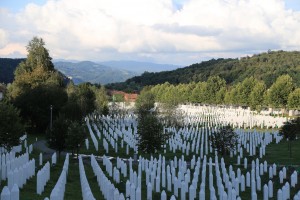
“How many people have to die to reach our conscience, to force us to help?” (photo: Benjamin Hennig).
Today more than 40 violent conflicts are being fought out worldwide, raising a humanitarian tragedy. Only this year around 130.000 refugees tried to seek shelter in Europe by crossing the Mediterranean Sea and thousands of them died during this undertaking. We are facing one of the most severe humanitarian catastrophes on the doorstep of Europe. Yet, we do not take action; we rather accept it insensibly and enjoy the fortress of Europe, as hardly anyone is standing up to oppose Europe’s failure to act. “We could have prevented it” – a sentence we will surely repeat over and over again, if we do not learn from history, such as the genocide in Srebrenica.
The way in which we deal with such conflicts, with the victims and refugees is a test of our society’s humanity – and we are failing at it. European politicians are consciously letting refugees die, and it seems they have no reason to worry about their reputation by doing so, since they still win elections with such attitude.
This is the tragedy of our time: the globalization of indifference.

